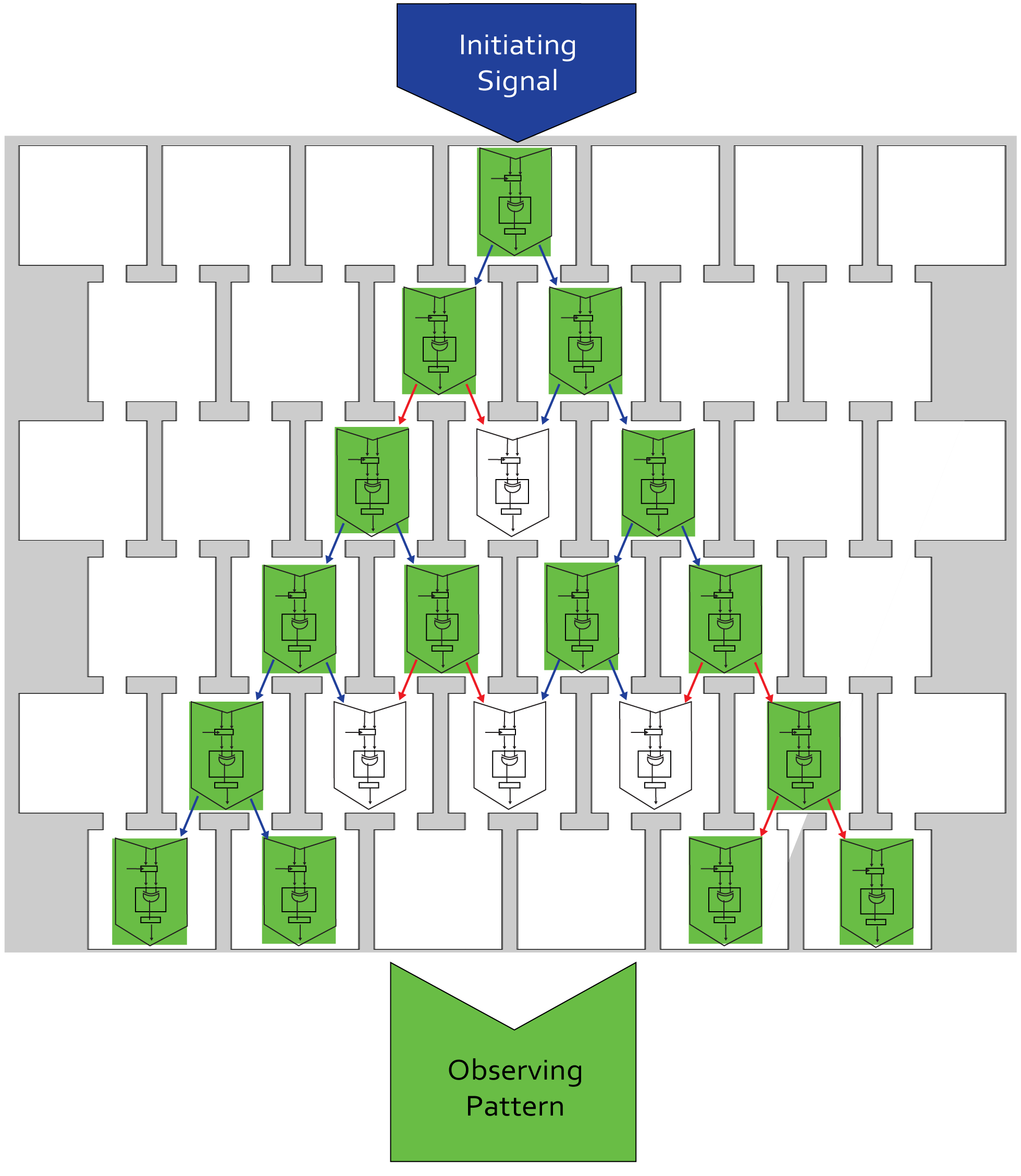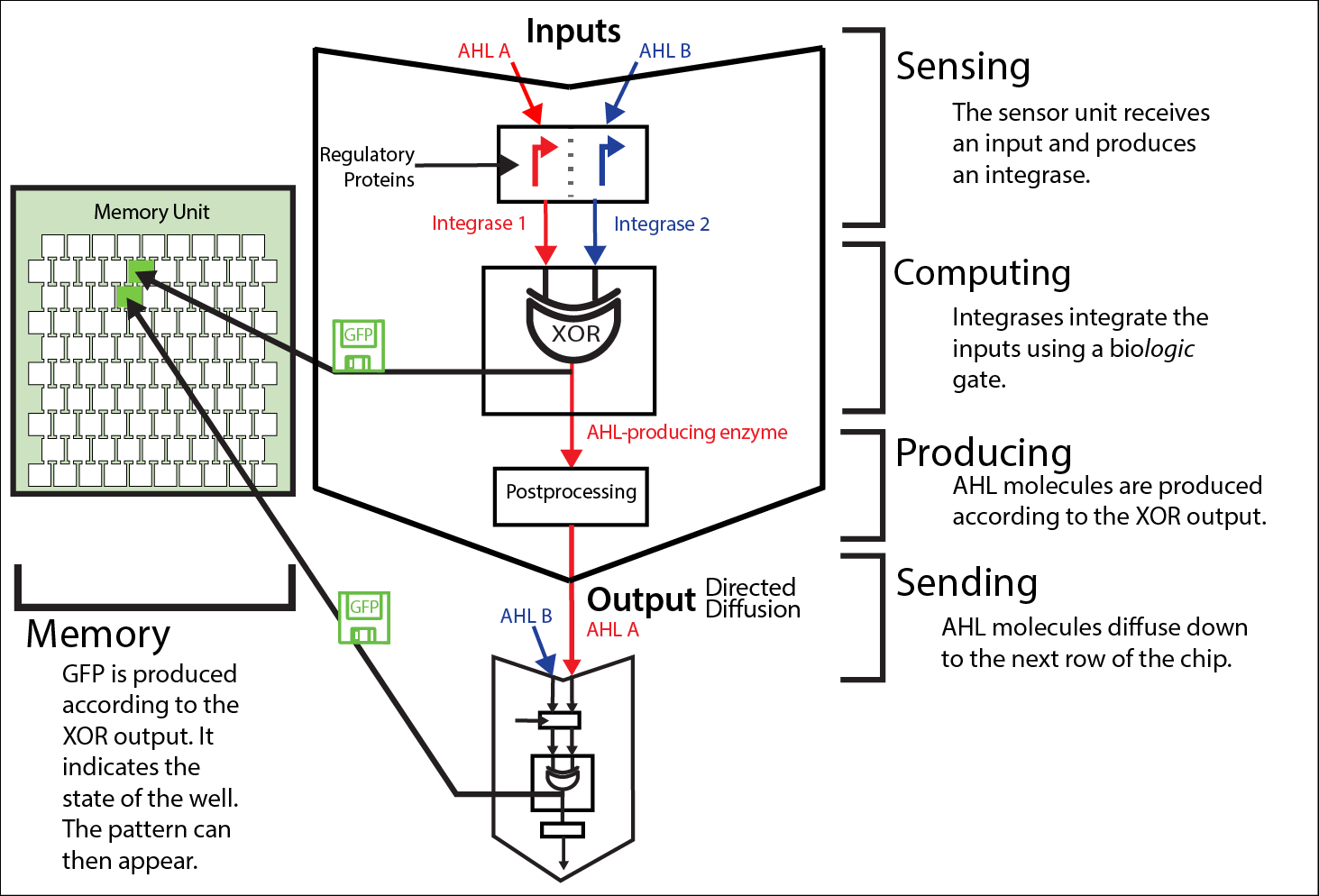Team:ETH Zurich/project/infopro
From 2014.igem.org
m (→Memorising) |
m (→Track: Information Processing) |
||
| Line 4: | Line 4: | ||
== Track: Information Processing == | == Track: Information Processing == | ||
| - | ''Engineering ways to make biological systems perform computation is one of the core goals of synthetic biology. We generally work at the DNA level, engineering systems to function using BioBricks. In most biological systems, protein-protein interactions are where the majority of processing takes place. We design proteins to accomplish computation would allow for systems to function on a much faster timescale than the current transcription-translation paradigm. These are some of the challenges that face teams entering projects into the Information Processing track in iGEM.'' [https://2014.igem.org/Tracks/Information_Processing (iGEM)] | + | |
| + | === About the track === | ||
| + | |||
| + | <center>''Engineering ways to make biological systems perform computation is one of the core goals of synthetic biology. We generally work at the DNA level, engineering systems to function using BioBricks. In most biological systems, protein-protein interactions are where the majority of processing takes place. We design proteins to accomplish computation would allow for systems to function on a much faster timescale than the current transcription-translation paradigm. These are some of the challenges that face teams entering projects into the Information Processing track in iGEM.'' | ||
| + | [https://2014.igem.org/Tracks/Information_Processing (iGEM)] </center> | ||
<br/> | <br/> | ||
<br/> | <br/> | ||
| + | === Pattern Emergence === | ||
We implement a cellular automaton in bacterial colonies. Each bacterial colony is a core, computing an XOR gate. A sensor device detects the inputs, HSL molecules. Then, the cell integrates the signal through a logic gate, performed by proteins, the serine integrases. A necessary post processing step generates the production of HSL molecules. Meanwhile, GFP, a visual read out, longlastingly indicates the state of the well. The produced signal then propagates in a directive fashion through a millifluidic chip. This iterative process faces the challenges of leakiness, cross-talk, protein-level computation and diffusion. | We implement a cellular automaton in bacterial colonies. Each bacterial colony is a core, computing an XOR gate. A sensor device detects the inputs, HSL molecules. Then, the cell integrates the signal through a logic gate, performed by proteins, the serine integrases. A necessary post processing step generates the production of HSL molecules. Meanwhile, GFP, a visual read out, longlastingly indicates the state of the well. The produced signal then propagates in a directive fashion through a millifluidic chip. This iterative process faces the challenges of leakiness, cross-talk, protein-level computation and diffusion. | ||
<br/> | <br/> | ||
<br/> | <br/> | ||
| - | [[File:ETH_Zurich2014_info_processing1.png|center|800px]] | + | [[File:ETH_Zurich2014_info_processing1.png|center|800px|thumb|'''The information pathway in the project Mosai''coli'' on a colony level.''']] |
=== Sensing === | === Sensing === | ||
| Line 38: | Line 43: | ||
<br/> | <br/> | ||
<br/> | <br/> | ||
| - | [[File:ETH_Zurich_Information_Processing_chip.png|center|600px|thumb|After initializing the signal, it propagates through the wells with directed diffusion. In each well, bacterial colonies have to be able to proceed in the information pathway: detecting (sensing), integrating (computing), producing and sending. These successive iterations leads to possible error propagation. Robustness is one major issue of our system.]] | + | [[File:ETH_Zurich_Information_Processing_chip.png|center|600px|thumb|'''The information pathway in the project Mosai''coli'' on chip level.''' After initializing the signal, it propagates through the wells with directed diffusion. In each well, bacterial colonies have to be able to proceed in the information pathway: detecting (sensing), integrating (computing), producing and sending. These successive iterations leads to possible error propagation. Robustness is one major issue of our system.]] |
<html></article></html> | <html></article></html> | ||
{{:Team:ETH_Zurich/tpl/foot}} | {{:Team:ETH_Zurich/tpl/foot}} | ||
Revision as of 20:50, 17 October 2014
Information Processing
Track: Information Processing
About the track
Pattern Emergence
We implement a cellular automaton in bacterial colonies. Each bacterial colony is a core, computing an XOR gate. A sensor device detects the inputs, HSL molecules. Then, the cell integrates the signal through a logic gate, performed by proteins, the serine integrases. A necessary post processing step generates the production of HSL molecules. Meanwhile, GFP, a visual read out, longlastingly indicates the state of the well. The produced signal then propagates in a directive fashion through a millifluidic chip. This iterative process faces the challenges of leakiness, cross-talk, protein-level computation and diffusion.
Sensing
Diffused HSL molecules are identified via quorum sensing. This integration from a continuous variable, the concentration of HSL, to a discrete variable, the activation of a promoter, is prone to errors due to leakiness and crosstalk between HSL molecules, regulatory proteins and promoters (we characterized it for [http://parts.igem.org/Part:BBa_R0062 Lux promoter (BBa_R0062)], [http://parts.igem.org/Part:BBa_R0079 Las promoter (BBa_R0079)] and [http://parts.igem.org/Part:BBa_R0071 Rhl promoter (BBa_R0071)]). To limit the risk of error propagation, we used a [http://parts.igem.org/Part:BBa_K1541000 riboregulating system].
Computing
Integrases compute an XOR logic gate via single switching or double switching of a terminator. Their behavior depends on a set of parameters.
Producing
The enzyme synthesizes the signaling molecule AHL.
Sending
The produced AHL diffuses through the channels to the rows below. The speed of this directed diffusion determines the time needed from the pattern to emerge. You can find out more information about diffusion and chip design on our modeling page, our experimental results page and our chip page.
Memorising
GFP is produced according to the XOR output. It indicates the state of the well. As it is a longlasting signal, the pattern can progressively appear.
then appear.

 "
"














